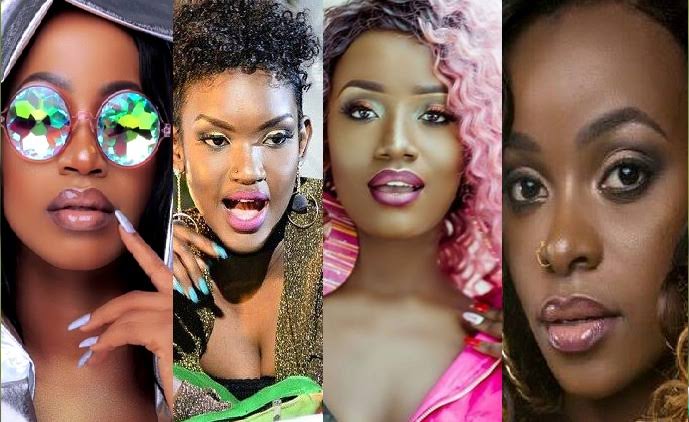
It’s the last quarter and at end of the year numerous music publications come up with their best of the year lists not forgetting the famous Bebecool list in the Uganda music industry.
Let’s say one makes a top ten list of artists they like right now it’s hardly 50% female dominated. With the likes of Azawi, Shebah, Spice Diana, Lydia jasmine, Fille there is reason to smile but not fully as most female artists that are said to have paved a way for these new acts retired to raising families.
In a discussion to this article one harsh participant says “Because women are less inclined to make good music. In general there are less female artists out there. Men are by definition more at home in a recording studio. You also need stamina to last in the music business…”.
I am not even going to dignify the statement about the difference in quality between music by male artists and female artists with a lengthy response, other than that it fits an ages old discourse in which ‘feminine’ music is viewed as lesser than more ‘masculine’ music.
In the end it all comes down to personal taste and while everyone is free to enjoy the music they want to, blaming the lower success rate of women in music on their lack of musical qualities is problematic.
So one may insinuate that most female artists, producers, musicians and songwriters lack the endurance to make it in the music business. What they fail to mention however, is that for years and years (and still ongoing I would say) women have had to fight harder to be taken seriously in their job within an industry that was and still is ruled mostly by men.
If one wants to fault female artists for not making it or not sticking around long enough, they also have to take into account the circumstances they are working under and how the game they have to play is not always a fair one.
With this pandemic and online music platforms taking the frontline for accessing music one May try to stress the fact that their top songs and artists can be selected by the people according to what they choose listen to on Spotify or other platforms.
Maybe, people are just naturally more drawn towards music created by men. As much as this is a possibility, you can’t argue this without looking at the circumstances.
Historically music in the 70s and 80s even more so than now, female artists were operating in a man’s world getting less airplay, recognition and resources and were therefore even more underrepresented than now. People who grew up in that era are simply more likely to vote for male artists and bands as that was the music they grew up with.
As for online platforms , One agrees that listeners these days are more autonomous when it comes to choosing what they want to listen to, but it is naive to think that streaming services are spaces completely free from what the powers in the music industry dictate to us.
First of all, lot of people still listen to the radio or watch tv and will later stream the songs by the artists they encounter there instead of just discovering all their music while streaming. Furthermore, Platforms like Spotify introduces new music to us in curated playlists and the recommendations come from algorithms based on trends in the music industry.
Interestingly enough, women often get their own playlists because they are again underrepresented on the main lists. As if gender makes it into a different genre.
Although one might not want to admit it, this whole discussion is bigger than playlists, algorithms and statistics. From personal experience, as a one who is generally speaking more drawn to music by female voices,I have often had my taste in music ridiculed.
While We have seen the gradual growth of female participation in the local music industry in the various genres it’s easy to testify that people’s taste in music is not set and is influenced by what is expected from them within gender roles, as well as what is trendy and not. Over the time I can also say I haven’t yet seen a prominent female music producer break through in Uganda.
With that in mind there are a couple more issues for one to consider and honestly think about. Do we really think that in girls today are as likely to be supported by family and friends to become a guitarist in a band as their male peers? Do we really believe that we hold male and female artists to exactly the same standards and not for example, judge female stars more often on their appearance? Would we just as often question if a male artist had actually written his own songs or be surprised they play their own instruments as we do with female artists? When we are talking about women being not as ‘at home’ in a recording studio as their male colleagues, would that be because they are naturally less savvy with the tech part, or would it be because they are less likely to be able to prove themselves as producers as the studio is by definition viewed as a male’s domain?
Compared to the past, the position of the female artist in the industry seems to have improved, but we are not nearly there yet. As long as there are people who blame women’s underrepresentation on their lack of musical qualities or stamina, we have to keep talking about representation, equality and gender stereotypes.

















